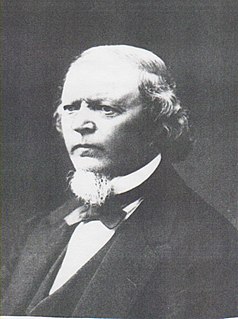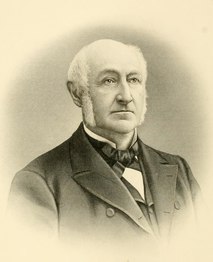Related Research Articles

Milwaukee County is located in the U.S. state of Wisconsin. As of the 2010 census, the population was 947,735 and was estimated to be 945,016 in 2020. It is both the most populous and most densely populated county in Wisconsin, and the 45th most populous county nationwide; Milwaukee, its eponymous county seat, is also the most populous city in the state. The county was created in 1834 as part of Michigan Territory and organized the following year.

Waukesha is a city in and the county seat of Waukesha County, Wisconsin, United States. It is part of the Milwaukee metropolitan area. Its population was 70,718 at the 2010 census. The city is adjacent to the Village of Waukesha.

William Augustus Barstow was an American businessman, politician, and public administrator. He was the third Governor and second Secretary of State of Wisconsin, and served as a Union Army officer during the American Civil War. Before Wisconsin became a state, he was instrumental in the creation of Waukesha County.
The Town of Milwaukee was a town in Milwaukee County, Wisconsin, United States, created on March 17, 1835. A number of Milwaukee County municipalities, beginning with the City of Milwaukee, were created out of portions of it. After the last portions of the town were annexed, it officially ceased to exist in 1955.

James B. Cross was an American lawyer and politician who served as the 9th mayor of Milwaukee, Wisconsin (1855–1858). A Democrat, Cross also represented Milwaukee for three terms in the Wisconsin State Assembly, and was the Party's nominee for Governor of Wisconsin in the 1857 election.

Jerome Anthony Watrous was an American author, newspaper writer, politician, and soldier.

Moses McCure Strong was an American lawyer, politician, businessman, and Wisconsin pioneer. He was one of the framers of the Constitution of Wisconsin, a member of the territorial legislature, and United States Attorney for the Wisconsin Territory under President Martin Van Buren. After Wisconsin achieved statehood, he was Speaker of the Wisconsin State Assembly during the 3rd Wisconsin Legislature.

George Gideon Abert was a Alsatian American immigrant, pioneer, manufacturer, and politician. He represented the city of Milwaukee for seven terms as a member of the Wisconsin State Assembly.
Jackson Hadley was an American businessman and Democratic politician. He served three years each in the Wisconsin State Senate and Assembly, representing Milwaukee County.
John Moon Wells was an American farmer from Prairieville, Wisconsin who spent a single one-year term in 1849 as a Free Soil Party member of the Wisconsin State Assembly from Waukesha County.
Adam E. Ray was an American farmer politician from Troy, Wisconsin who served several terms in the Legislature of Wisconsin Territory, and a single term in 1851 as a Free Soil Party member of the Wisconsin State Assembly from Walworth County.
Benjamin Hunkins was an American politician who had a role in shaping the Wisconsin constitution.

Winchel Dailey Bacon was an American farmer, schoolteacher and businessman from Waukesha, Wisconsin who was active in the abolitionist movement and as a prominent Baptist layman, and served in the Wisconsin State Assembly as well as in other local offices.
Joseph Turner was an American farmer, Democratic politician, and Wisconsin pioneer. He represented Waukesha County in the Wisconsin State Senate during the 1st Wisconsin Legislature (1848). Two of his sons were also Wisconsin legislators.
William Wells Brown or W. W. Brown was an American merchant and pioneer settler of Milwaukee, Wisconsin. He was a member of the Wisconsin State Assembly for the 1st Wisconsin Legislature (1848).
Joseph Bond was a pioneer settler of what became Waukesha County in the Wisconsin Territory, and an active Democratic politician, serving in the territorial legislature and later in the Wisconsin State Assembly as well as holding local offices.

Thomas Sugden was an English American immigrant, farmer, and Wisconsin pioneer. He served three terms in the Wisconsin State Assembly, representing Waukesha County. Originally a Whig, he became an active member of the new Republican Party when it was organized in Wisconsin.
Solon Johnson was a pioneer farmer from Port Washington, Wisconsin who spent two one-year terms as a member of the Wisconsin State Assembly from Washington County, Wisconsin and held various local offices, before moving on to become a prospector and miner in California and Montana.
William Shew was a farmer and businessman from Oak Creek, Wisconsin and Cordova, Illinois who served multiple terms in the Wisconsin Territory House of Representatives representing Milwaukee County, and was Speaker of the House of that body during the first (1847) session of the 5th Wisconsin Territorial Assembly, as well as holding various local government posts.
James Pitman or Pittman Cox was a tanner, farmer, sheriff and judge from Grant County, Wisconsin.
References
- ↑ Watrous, Jerome A. Memoirs of Milwaukee County: From the Earliest Historical Times Down to the Present, Including a Genealogical and Biographical Record of Representative Families in Milwaukee County Volume 1. Madison: Western Historical Association, 1909; p. 58
- ↑ Flower, Frank Abial. History of Milwaukee, Wisconsin: From Pre-historic Times to the Present Date, Embracing a Summary Sketch of the Native Tribes, and an Exhaustive Record of Men and Events for the Past Century; Describing, the City, Its Commercial, Religious, Educational and Benevolent Institutions, Its Government, Courts, Press, and Public Affairs; and Including Nearly Four Thousand Biographical Sketches of Pioneers and Citizens Chicago: Western Historical Company, 1881; p. 137]
- ↑ Watrous, p. 266
- ↑ The History of Waukesha County, Wisconsin. Containing an account of its settlement, growth, development and resources; an extensive and minute sketch of its cities, towns and villages--their improvements, industries, manufactories, churches, schools and societies; its war record, biographical sketches, portraits of prominent men and early settlers; the whole preceded by a history of Wisconsin, statistics of the state, and an abstract of its laws and Constitution and of the Constitution of the United States Chicago: Western Historical Company, 1880; pp. 486, 523, 526, 842
- ↑ The History of Waukesha... pp. 385-386
- ↑ Watrous, p. 57
- ↑ The History of Waukesha... p. 1004
- ↑ "A Thief." The Radical (Bowling Green, Missouri) . May 28, 1842; p. 3, col. 2; via Newspapers.com
- ↑ "Wisconsin Pioneers: Their Reunion at Madison Last Week -- A Very Enjoyable Occasion -- List of Those Who Were Present" Superior Times July 26, 1879; p. 2, col. 5 via Newspapers.com